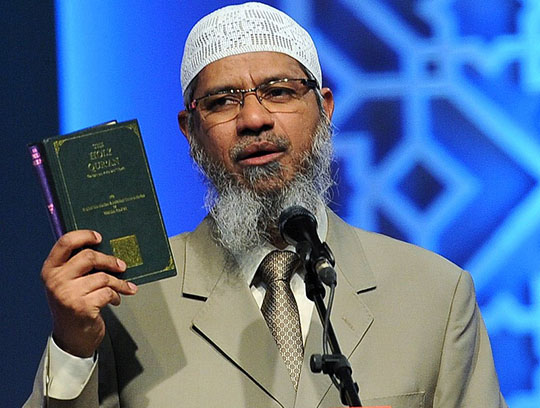Mangaluru, Sep 1: Even after two months of rigorous investigation the security agencies have not found any solid evidence against Islamic preacher Dr Zakir Naik, who is accused by a section of media of inspiring terrorists and violating foreign funding norms.

No violations
Highly placed sources said that the Islamic Research Foundation, the NGO run by Dr Naik, has almost come out clean on foreign donations received. In its reply submitted before the home ministry last week, Dr Naik's NGO has given details of funds reportedly received in 2014 from Dubai with an explanation on expenditure, a senior MHA official said on the condition of anonymity.
The NGO has received nearly Rs 93 lakh from Dubai in 2014. Naik's spokesperson Arif Malik said: "In 2014-15, MHA carried out inspection of our accounts and foreign donation utilisation and after three weeks of exhaustive investigations gave us a clean chit.
Still the NGO is facing the threat of ban under Unlawful Activities Prevention Act (UAPA) after solicitor-general Ranjit Kumar wrote to the Ministry of Home Affairs asking it to take action against the televangelist.
Probe to be intensified
Meanwhile, the security agencies have been asked to analyse Dr Naik's speeches in a more comprehensive manner and conduct a more exhaustive probe before any decision is taken on whether to gag him and ban his NGO, Islamic Research Foundation (IRF), as an unlawful association.
The development comes with the Law Ministry advising the Ministry of Home Affairs (MHA), which has jurisdiction over security agencies, that not enough evidence is on record to proceed against Naik.
“We have been advised to analyse a larger number of speeches delivered by Naik to arrive at a clearer picture of whether he is liable for any action. While several of his speeches have already been analysed, we will now have to go through as many of his speeches as is possible – not all his speeches might be easily available,” a source in the MHA said.
The process could take weeks, or even months, as it is “extremely laborious”. The source said, “Videos of Naik's speeches available in the public domain will have to be authenticated to prove they are not doctored in any way, and then they will have to be carefully transcribed.”
Terror allegations
Meanwhile, security agencies have claimed that nearly 55 terror accused, arrested from across the country over the past decade, have reportedly been influenced by Dr Naik, or at least they have watched Dr Naik's speeches. These terror accused include those who were picked up as far back as 2005. However the agencies have failed to produce any proof for their claims.
Dr Naik's lawyer has refuted these allegations and said that if his speeches are seen in their full context, no one would conclude that he had inspired people to commit acts of terror. Those leveling allegations against Naik might have relied upon doctored speeches available on the Internet, and not on the entire speech, his lawyer had earlier said.






Comments
I hope many will convert to Islam after hearing his speeches.
Government should allow entire nation to hear his speeches and take decisions.
this will be another blow to BJP led MODI personality ...this is to divert Bhakths away from Babri masjid issue and corruption ,,,,
O bhakthon jaan lo
Al Hamdulillahi Rubil Al Alameen.....
Honey trap ! Why only muslim media reporting with headlines.. Zakir naik news
Jangal main more nacha
Kisne dekha !
Al Hamduillha Truth all ways win
whoever, goes deeper and deeper on islamic speech will embrace Islam.
Do any type of investigation, as long as it is fair and honest, there is no problem.
We know Dr. Naik and his NGO. Even many common Non-Muslims specially educated Hindus know him.
If anybody tries to harm deliberately such innocent great personality, definitely they are spreading communal disharmony and it will be very costlier to them.
Be sincere and be fair.
Naren, even if your hypocrite brothers investigate thousands and thousands of files , you will not get any thing out of it..... Truth always wins, Insha Allah
everyone knows Dr. Zakeer naik did not do any wrong. why this RSS people want him to implicate in wrong case?
Let police go and find real goondas and babas in politics who are looting India and killing indians, Kidnapping Girls, and carrying out bomb blasts
Surely U go deeper and deeper and deeper and will dig your own grave... U will not find any link to terrorist...
Understand the TRUTH and PONDER on what Dr. Zakir naik conveys...
Chaddis should understand that Zakir Naik brings white money to our economy.....never ever utilized it for any illegal purpose....probe team got babaji's tullu....wasted tax payers money for this probe.....
Add new comment